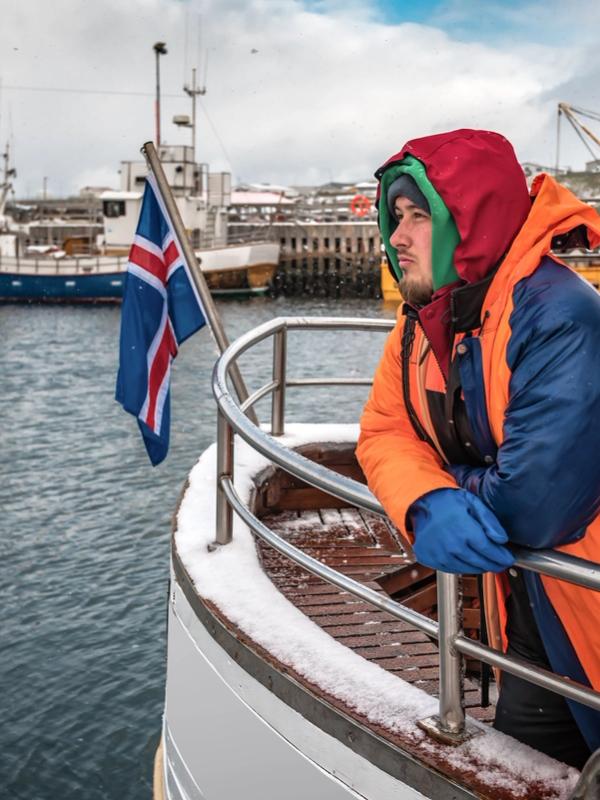
Fishing Delights: Exploring the Waters of Iceland
Calling all Fishermen! You can travel to Iceland and fish in the country's lakes, rivers, and even the deep blue sea. Iceland is known for its charming fishing villages and high-quality fish. So can you fly here and catch your own dinner? Yes, you can, but there are rules and regulations that you will need to follow. We are going to share a variety of tips and tricks so you can fish responsibly in Iceland.
The Importance of Fishing in Iceland
Since the Viking Age, fishing has been a vital part of Icelandic culture and economy. The prime location of the country provides a variety of different fish species.
In the Middle Ages, fishermen were known to catch a majority of cod and herring. They then sold them to the European Markets.
Later in the 18th and 19th centuries, Iceland stepped up its game when it came to fishing. They used modern fishing techniques using boats, nets, and processing facilities. In fact, the first fishing boat powered by steam engines hit the water in the late 19th century.
In the 20th century, fishing fueled Iceland's economy, making the country a hot spot for fresh and high-quality fish.
Today the fishing market is still high and continuously keeps Iceland’s economy alive. If you are visiting Iceland you have to try fresh fish dishes from restaurants, food trucks, and more.
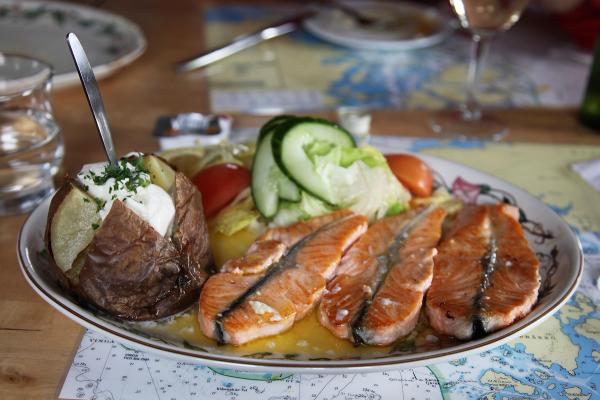
Do I need a fishing license to fish in Iceland?
Yes, you need a fishing license to fish in Iceland. The license is required for both freshwater and saltwater fishing,
So where can you get one? You can obtain the Veiðikortið 2023 Fishing Card from local tourist information centers, fishing shops, or online.
The license cost varies depending on the type of fishing you want to do, and the duration of the license.
Can I bring my own fishing equipment to Iceland?
Yes, you can bring your own fishing equipment to Iceland. However, it's important to check with your airline to make sure your equipment meets its size and weight restrictions.
It is illegal to use any tackle that hooks a fish without it chasing it. If you bring your own equipment, it has to be disinfected before use.
A certificate of disinfection must be shown upon arrival in Iceland. If for any reason you cannot provide this, customs will make you disinfect the equipment at the airport.
What types of fish can I catch in Iceland?
Iceland is home to a wide variety of fish, which is why so many people travel here from all over the world just for fishing.
Here are some of the most popular Icelandic fish and where you can find them.
Atlantic Salmon: Iceland is known for its excellent salmon fishing and salmon dishes in restaurants.
The season for Salmon fishing in Iceland runs from June to September, and there are many rivers throughout the country where you can catch this prized fish.
Brown Trout: Brown trout are freshwater fish in Iceland. Trout fishing in Iceland runs year-round, and they can be caught in many rivers and lakes throughout Iceland.
Arctic Char: Arctic char is a cold-water fish that is usually caught by fly fishing. They are a challenge to catch, which makes them even more of a prize.
They can be found in many of Iceland's lakes and rivers from late May to early August.
Cod: Cod is a typical saltwater fish in Iceland that is normally caught on sea fishing trips. It is a fish that is frequently spotted on dinner menus.
The season to catch cod in Iceland runs year-round but it is said that March and April are the best times to go.
Haddock: Haddock is a saltwater fish that is similar to cod in appearance.
Haddock is caught all around Iceland, with the best areas in the Westfjords. Icelandic Haddock season run from September through May
Halibut: Halibut is a large luxurious fish that is highly priced on dinner menus. It is commonly referred to as a trophy fish by fishermen.
If you are lucky enough to catch one it would be on a sea fishing trip. The prime time to go is from April to September when Halibut is in season in Iceland.
What is the best time of year to go fishing in Iceland?
As you can see, the best time of year to go fishing in Iceland depends on the species you are targeting. You want to plan your trip around the type of fish you want.
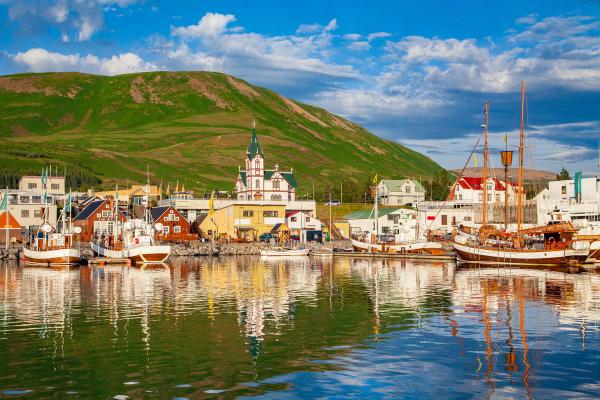
Spring to early summer is the best time to go as that is when most fish are in season.
Are there any restrictions on fishing in Iceland?
Yes, there are restrictions when fishing in Iceland. Here are some of the most common restrictions you should know.
Always ask an Icelander if you have any questions about a specific fishing area in the country to avoid breaking any laws.
Catch-and-Release: Many of Iceland's rivers and lakes are catch-and-release only. This means you cannot keep the fish you catch. Instead, you will have to release them back into the water.
Size Limits: Different types of fish will have different size limits. This means you can only keep a fish that falls in the legal weight and size range.
This ranges per fish, so you want to research this before heading to the water.
Closed Seasons: Fishing is not allowed during certain times of the year, depending on the type of fish. This is designed to protect the fish during their spawning season, so the surplus will never be low.
Gear Restrictions: There are gear restrictions on different types of fish, depending on where you are going. This rule was created to help reduce the negative impact on the fish and their habitat.
Always check local regulations before fishing, as many of these rules are put in place to help protect the species of fish. You can do this by visiting fishing stores or local government offices during your trip.
Different Types of Fishing in Iceland
There are several different types of fishing available in Iceland, each with its own unique challenges and rewards. Here are some of the most popular types of fishing in Iceland.
Rod Fishing
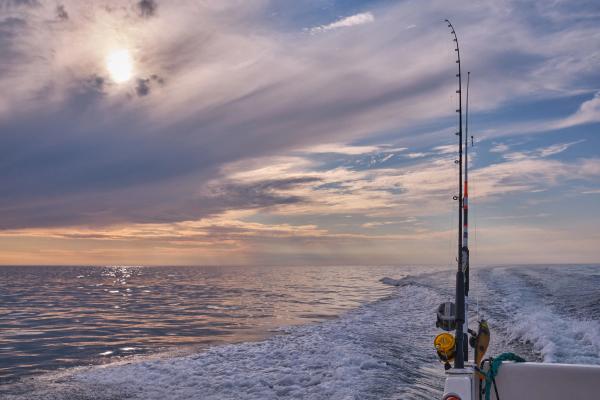
Rod fishing is doable in Iceland, but there are a few rules you will have to follow for freshwater fishing. If you are planning on rod fishing from the shore, check local signs on fishing rules.
Rod Fishing is only legal for 12 hours per day during the season. You can fish anytime from 7:00 AM until sunset.
Ice Fishing
If you are traveling to Iceland in winter, you can take part in Ice Fishing. Iceland's lakes and rivers freeze over, making them accessible for ice fishing.
When Ice fishing, you will drill a hole in the ice and drop a line with bait into the water. It is not an easy way to fish and only experienced fishermen should attempt this in Iceland.
It usually takes specialized equipment to break through the ice, such as an ice auger. You will also need a warm shelter due to Iceland’s climate.
River Fishing
If you are looking to catch salmon or trout, Iceland’s river fishing may be for you. Iceland is famous for its salmon and trout rivers, which attract fishermen from all over the world.
You will walk through the river and cast your line for a chance to catch your own. It is important to note that many of Iceland's rivers are catch and release, so be sure to ask before attempting. Other rivers allow limited harvesting of fish.
Lake Fishing
Lake Fishing is another great option for fishermen in Iceland. Here you can commonly catch trout and char. You can fish in a lake either right from the shore or take one of the many boat tours.
Fly Fishing
Fly fishing is a popular way of fishing in Iceland. It involves using a fly, which is artificial bait made from feathers, fur, and other materials. You will attach the bait on the end of a line to catch fish.
Many of Iceland's rivers and lakes are known for their excellent fly fishing opportunities, especially for trout and salmon. Chances are you will see a lot of locals and visitors fishing this way.
Sea Fishing
Sea fishing is common in Iceland and this is where many of those fresh fish dinners come from. The country's waters are rich in fish, including cod, haddock, and halibut.
Where To Fish in Iceland
As you can tell, certain fish are found in certain areas throughout the country. Here are some different bodies of water where fishing is common.
Rivers: Iceland is famous for its salmon and trout rivers, including the Laxa in Adaldal, the Thvera, and the Blanda.
Lakes: Iceland’s small lakes are ideal for trout fishing. Some popular areas you can trout fish at are Lake Laugarvatn and Lake Myvatn.
Sea Fishing: A lot of Iceland’s fish come from the deep sea since the country is surrounded by it! These waters are populated with cod, haddock, and halibut.
You can go deep sea fishing in Iceland from popular cities such as Reykjavik and Akureyri.
You can also take your Iceland car rental to the fishing village of Husavik, which is famous for its fishing.
Do I need a guide to go fishing in Iceland?
You don't necessarily need a guide to go fishing in Iceland, but it's highly recommended if you're new to the area or unfamiliar with the local fishing practices.
Iceland fishing guides will help you find the best fishing spots and also provide you with equipment, and ensure that you're following local regulations.
Guided Fishing Tours
If you are new to fishing or want an expert to teach you about the area, guided fishing tours are the way to go. There are so many offered throughout the whole country, and most of them are accessible by a quick drive in your Iceland rental car.
Fish Partner
Take a fishing day tour with Fish Partner! This popular fishing tour company offers Iceland Fishing Package Tours throughout the country. You can take a day trip to Lake Thingvallavatn to catch Big Browns and Arctic Char. If you want to go into the deep sea, you can, by taking the Sea Angling Tour from the Snæfelsnes peninsula.
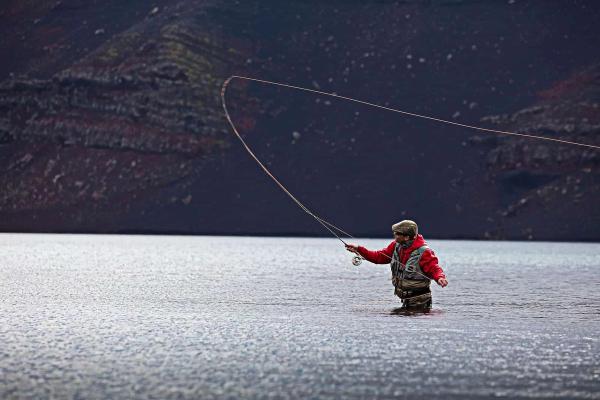
We should probably mention that they also have a Volcano Fishing Tour. This a once-in-a-lifetime experience that will allow you to fish fishing inside a volcano
Adventures Sea Angling
Adventures.com offers an amazing Sea Angling Tour for those looking to get out on the deep sea. It is good for both first-timers and experienced fishermen.
You will leave Reykjavik’s Old Harbour and head out to Faxaflói Bay. Fish are very common here making it a great opportunity to catch some. The guides will show you how to bait and catch if it is your first time too.
You will have a good chance of catching cod, haddock, rockfish, and pollock.
Elding Adventure at Sea
Take a fishing tour right from Reykjavik with Elding Adventure at Sea. They offer a 3-Hour Sea Angling Gourmet Experience Tour which is well worth your time!
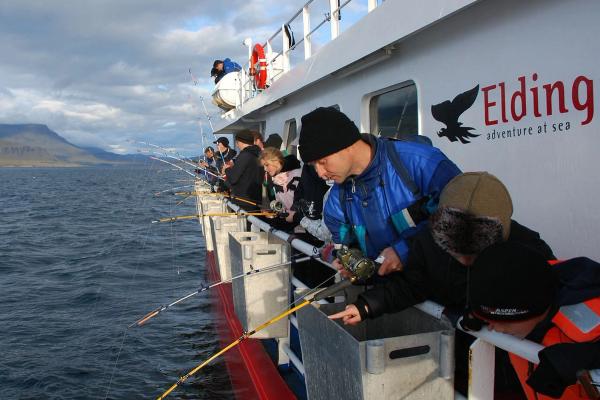
This 3- to 3.5-hour sea angling will not only allow you to catch catfish, cod, haddock, mackerel, and pollack, but they also will cook it for you! The crew will barbeque the fish and serve it with homemade sauce and potatoes.
You will even make a stop at the famous Puffin Island. Enjoy viewing the adorable birds while enjoying the meal that you caught.
Fishing Lodges in Iceland
Stay in a fishing lodge during your Iceland fishing vacation! Here are a few of our top picks.
Myrarkvisl Fishing Lodge
Experience the comfort of the newly built Myrarkvisl fishing lodge, which was built in 2017. There are four spacious double bedrooms, each equipped with an ensuite bathroom.
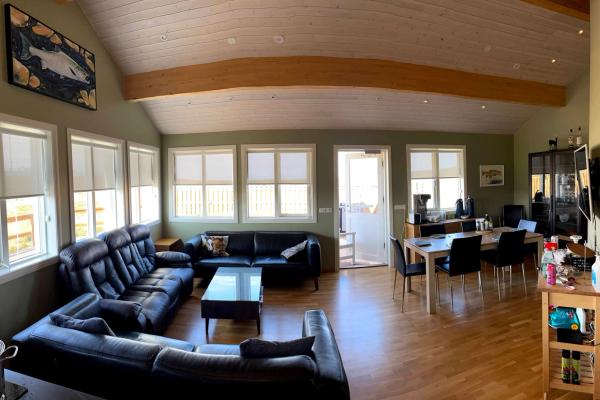
The lodge features a spacious living area, dining area, a fully equipped kitchen, a wader/drying room, a hot tub, and an outdoor BBQ. You can sign up for one of their many fishing tours as well!
Eleven Deplar Farm
Nestled in Iceland’s Troll Peninsula in northern Iceland is Eleven Deplar Farm. This is a luxurious retreat that is perfect for Iceland fish trips.
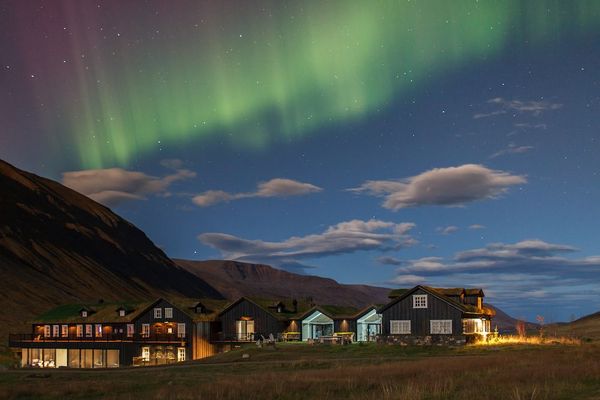
The area is stunning and surrounded by stunning mountains, lakes, and rivers, making it the perfect destination for an Icelandic adventure. Many anglers use it as a base from which to explore some of Iceland’s most famous rivers, including the Fljótaá, Hölkná, and Húseyjarkyísl
Many come here for fly fishing in Iceland. Expert guides will equip you with flies, nets, rod mounts, leaders, and nylon. And most important, they’ll know which flies to tackle and suit the conditions.
Eyjar Fishing Lodge
Located in Breiðdalsvík in East Iceland is Eyjar Fishing Lodge. The lodge provides comfortable accommodations so you can fish all day and relax all night.
Fish at Minnivalalliæk Creek or catch Icelandic salmon on the Hrútafjörður. The lodge owners will give you recommendations on where to go in the area for prime fishing.
FAQ :
Is it expensive to fish in Iceland?
Yes, Iceland is known to have expensive fishing, especially in the rivers. The cheapest way to experience Iceland Fishing is to take a tour.
What is the most common fish caught in Iceland?
Atlantic cod, also known as Gadus Norhua, is the most common fish in Iceland. Which is great, because it is definitely delicious !
Do people in Iceland eat a lot of fish?
Yes, you will find fish in a stew, boiled, fried, roasted, or grilled in Iceland. It is one of the most popular dishes in the country thanks to the amount of fish you can find in rivers, lakes, and seas.
